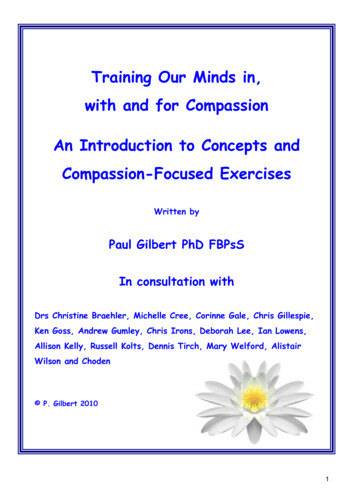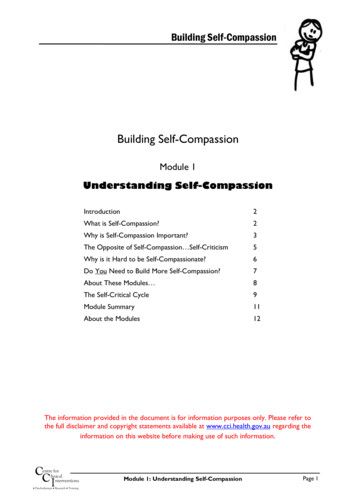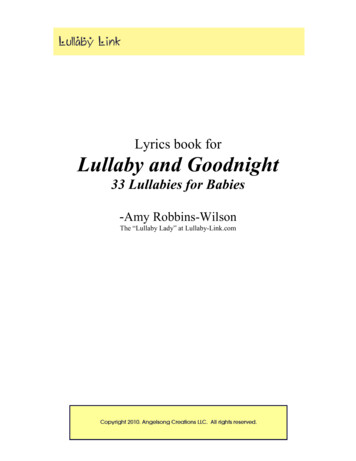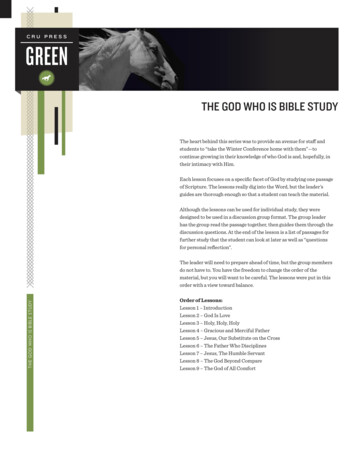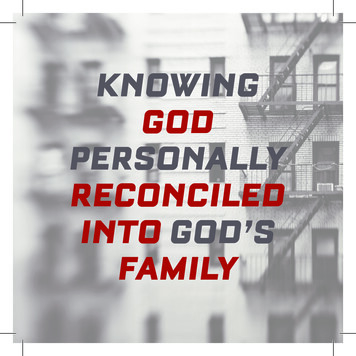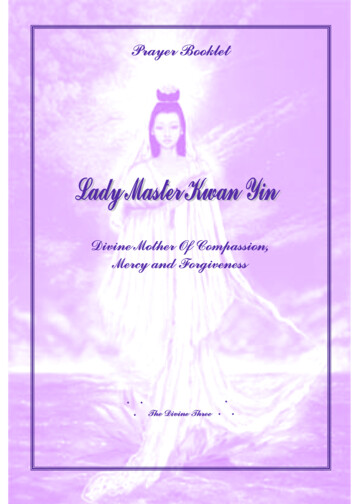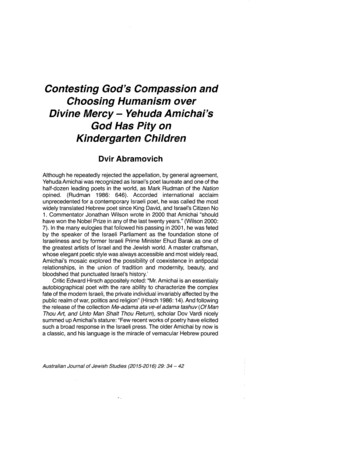
Transcription
Contesting God's Compassion andChoosing Humanism overDivine Mercy - Yehuda Amichai'sGod Has Pity onKindergarten ChildrenDvir AbramovichAlthough he repeatedly rejected the appellation, by general agreement,Yehuda Amichai was recognized as Israel's poet laureate and one of thehalf-dozen leading poets in the world, as Mark Rudman of the Nationopined. (Rudman 1986: 646). Accorded international acclaimunprecedented for a contemporary Israeli poet, he was called the mostwidely translated Hebrew poet since King David, and Israel's Citizen No1. Commentator Jonathan Wilson wrote in 2000 that Amichai "shouldhave won the Nobel Prize in any of the last twenty years." (Wilson 2000:7). In the many eulogies that followed his passing in 2001, he was fetedby the speaker of the Israeli Parliament as the foundation stone oflsraeliness and by former Israeli Prime Minister Ehud Barak as one ofthe greatest artists of Israel and the Jewish world. A master craftsman,whose elegant poetic style was always accessible and most widely read,Amichai's mosaic explored the possibility of coexistence in antipodalrelationships, in the union of tradition and modernity, beauty, andbloodshed that punctuated Israel's history.'Critic Edward Hirsch appositely noted: "Mr. Amichai is an essentiallyautobiographical poet with the rare ability to characterize the complexfate of the modern Israeli, the private individual invariably affected by thepublic realm of war, politics and religion" (Hirsch 1986: 14). And followingthe release of the collection Me-adama ata ve-el adama tashuv (Of ManThou Arl, and Unto Man Shaft Thou Return), scholar Dov Vardi nicelysummed up Amichai's stature: "Few recent works of poetry have elicitedsuch a broad response in the Israeli press. The older Amichai by now isa classic, and his language is the miracle of vernacular Hebrew pouredAustralian Journal of Jewish Studies (2015-2016) 29: 34 - 42
Dvir Abramovichinto poems that speak to everyone" (Vardi 1987: 150). An oft-repeatedanecdote about Amichai's popularity and accessibility among the youngis that during the 1973 Yorn Kippur War, Israeli students who weremobilized for the war effort packed a book of Amichai's poems along withtheir military gear and rifle.An artist who expressed the emotions others would articulate if theywere poets, Amichai's first collection Achshav u-beyamim acherim (Nowand in Other Days, 1955) transformed Israeli poetry with its shunning ofthe formalism of the pre-state poets and its employment of slang andmodern vernacular. Small wonder, then, that when he died, scholarsreminded readers that with this and subsequent collections, Amichailiberated Hebrew literature from its deep stupor, rigidity, and immersionin biblical phraseology, making it more concordant with modern realities:"Mr. Amichai's work is remarkably accessible, imaginative, unburdenedby artificiality and often almost conversational," noted author Mel Gussow(Gussow 2000: 14).Still, for all his iconoclasm, Amichai borrowed heavily from thescriptures, overlaying the archaic with a contemporary patina, as in asequence describing a man under a fig tree calling another standingunder a vine. The early poems also deal with his father's death andtheir complex relationship. His second collection, Be-merhak shteitikvot (Two Hopes Away, 1958), inaugurated the seminal themes thatwould characterize his corpus, such as war, memory, displacement,the figure of the father, the nature of Jewish identity, the disillusionmentof the post-war generation, and love. The poems mirrored the centralconcerns and preoccupations of a whole generation of Israelis, yet,as he proved with his later work, Amichai's exploration of humanityand its problems touched the core of any modern society.As stated earlier, despite all the modernism that shimmers throughhis poems, Amichai possessed a multivalent Jewish sensibility thatbraids the very personal with the mythic. Since he saw himself as aconduit between the old and new, the Jewish past is often alluded to,both in theological meditations and in its reverberations through thelife of Israeli society. For instance, one of his longest poems, the epicfifty-seven stanzas "Masot Binyamin haacharon miTudelah" ("Travelsof the Last Benjamin of Tudela," 1968) about the great medievalJewish traveler of the second half of the twelfth century was pennedwhile Amichai was living on Benjamin of Tudela Street in Jerusalemand is brimful with self-referential elements and the autobiographical.Amichai's canvas is characterized by colloquial language, selfdeprecating humor, irony, and the autobiographical, showcasing a35
Contest God's Compassion and Choosing Humanism over Divine Mercydepth of emotion that was raw and introspective. With a few wordsand images, he could deliver special insight and evocative associationon a breadth of such weighty issues as the Holocaust, God, loss,idealism, war and national destiny, unlocking a world leavened withallusions from the Hebrew Bible, and the quotidian. Typically, heprobed, at times with a prophetic voice, the nexus between polartropes-natural forgetting and the burden of memory, faith and doubt,personal and public history-tropes that acutely govern life in Israel.Though his poems were scented with metaphor (he once noted thatthe metaphor was equal to the invention of the wheel), they werenever elusive and always astonishingly concrete and personal. Histranslator and friend Ted Hughes described the personal impact hefelt reading Amichai: ''The effect his poetry has on me is to give memy own life- to open it somehow, to make it all available to me afresh,to uncover all kinds of riches in every moment of it, and to free mefrom my mental prisons" (Hughes as cited in Wilson 2000: 7).A substantial portion of Amichai's writing zeroed in on Jerusalem'spolitical and religious undercurrents, reflecting his profound admirationfor and exasperation with the city as an epicenter of history and conflictthat transcends the imagination. The magisterial cycle of poems"Yerushalayim 1967" ("Jerusalem 1967") embodies the specialinterconnectedness he felt existed between the capital and the Jewishpeople. In one poem, he wryly comments on the gravity of living inJerusalem, warning embracing lovers to be careful since every displayof love can turn into a new religion. As a result, he was labelled theWalt Whitman of Jerusalem. Amichai wrote that the Jews, rather thanbeing a historical people, were a geological nation, tied to their landby vows and oaths.When the late Israeli prime minister Yitzhak Rabin won the NobelPeace Prize in 1995, he asked Yehuda Amichai, as the man oftendescribed by the Israeli press as the spokesperson for his fellowcitizens, to join the official Israeli delegation and read one of hispoems, "Pirhei Bar" ("Wildpeace," 1971 ), which includes these tellinglines: "Let it come I Like wildflowers I Suddenly, because the field musthave it: wildpeace." Upon acceptance, Rabin quoted from "Elohimmerachem al yaldey hagan" ("God Has Pity on KindergartenChildren")-Amichai's signature verse. Rabin then added his ownwords: "Let's hope that now there will be pity for us all." Chana Blochnotes that "Amichai's lines seem chillingly apt in the light of the Rabinassassination at a peace rally less than a year later" (Bloch 1996: xiv)."Elohim merachem al yaldey hagan'" (hereinafter "God Has Pity36
Dvir Abramovichon Kindergarten Children") has become one of Yehuda Amichai's mostquoted and anthologized poems. Appearing in his first volume of verseAchshav u-beyamim acherim (Now and in Other Days, 1955), itoperates on multiple levels, but given its historical proximity to Israel'sWar of Independence of 1948, one is hard-pressed not to view itssurface theme as that of the savagery and price of war as well thesacrifice of its young soldiers. In various ways, it reiterates Amichai'sengagement with the vulnerability and the inherent weakness of theadult man and underscores his fascination with the emotional traumafelt by war-fatigued Israelis.However, the poem also typifies Amichai's penchant, especially inhis early poetry, to challenge and transform in an acutely ironic fashionthe traditional perception of God as merciful. Having been a studentin religious schools in Germany and Israel, Amichai had a verycomplex relationship with Orthodox Judaism. Through his texts, heconducted a grand theological argument with the almighty, rejectingany submissive reverence and the certainties of an exclusive faith.For example, the companion piece to "God Has Pity on KindergartenChildren" is "El male rachamim" ("A God Full of Mercy," 1960) whichlimns similar terrain, featuring a speaker who relates a life redolentwith pain and misery, angry at a God who has kept all lenity to Himselfwith the result that the world is empty of mercy. Amichai differed fromhis contemporaries in that he integrated God into the texture of hispoetry not only as a central factor but also as a dominant part of hisindividual development.The title "God Has Pity on Kindergarten Children" positions thereader to expect a poem praising God's benevolence, but the poemquickly develops into a searing tract about a universe devoid of higherkindliness, ruled by a deficient, indifferent, and capricious God. Thetitle is clearly ironic, for as the reader gradually discovers, the God thatis described here dispenses mercy in an arbitrary and cruel manner.The first two lines foreground one of the poem's key themes-thatchildhood and youth provide a type of protection and shelter deniedto the adults: "God has pity on kindergarten children, I He has lesspity on school children" (Amichai). At first, we are told that God doesshow mercy, but it is allocated in a discriminatory manner, only tothose who are regarded as totally pure-kindergarten children and, toa lesser extent, schoolchildren.In a sense, God offers his concern and protection to the innocentand powerless, and as Amichai argues, age becomes the primarydeterminant tor whether one is to be guarded from harm or exposed.37
Contest God's Compassion and Choosing Humanism over Divine MercyOr as Glenda Abramson asserts, it is not only age that is a factor: "Italso implies a connection between God's mercy and human purity foronly kindergarten children are entitled to mercy, the rest of humanity,presumably, to justice alone" (Abramson 1997: 114).In an interview with National Public Radio, Amichai said that thepoem is also about war and about the order of life: "We all have pity ona small child. And the bigger they grow, the less we need to have pity.But certainly, a grown-up man, a soldier at his full power, his full strength,he needs more help than all the babies together" (Siegel 1995).On the other hand, Amichai's frighteningly distant God deprivesthe vulnerable grown-ups (embodied here as soldiers) of Hissanctuary, even though soldiers are customarily more in peril thansmall children. As Joseph Cohen notes, "Adult soldiers in combat areordinarily far more exposed to destruction than are small children, butfor them God provides no watchfulness" (Cohen 1990:110). Amichaimarshals the image of soldiers, crawling on all fours in the hot sandstoward the first-aid station, bloodied and wounded, to underline theidea that combatants, in this instance during the 1948 War ofLiberation, were not the objects of God's vigilance. More broadly, this"last station" could symbolize the final destination for all men. To besure, this particular image struck a chord with Israelis, all too wellacquainted with the high cost of successive wars. The soldiers, leftentirely alone, have reverted to their infant state, dragging themselvesas children, their wounds both physical and mental. In a way, thecrawling could be deciphered as pleas for help by the soldiers,groveling before God, on their hands and knees, fuelled by the desireto survive. Vair Mazor adds the following comment:The narrator's blatant accusation against God, who wrongly andstingingly distributes His mercy, takes on a singular meaning asthe castigated adults are portrayed as wounded soldiers . Thephrase "crawling on all fours" also likens the adults to helplessinfants and consequently emphasizes their miserable condition.(Mazor 1986: 15)In the second stanza, the soldiers of the opening lines have beenreplaced with true lovers, and life has displaced mayhem andbloodshed. Amichai likens God to a tree, and His creations areallegorized as lovers and as a homeless person sleeping on a publicbench. The poem stresses that among the band of grown-ups-thosewho were refused protection in the first stanza- "true lovers" may be38
Dvir Abramovichdeserving of God's love ("But perhaps he will watch over true loversand have mercy on them and shelter them like a tree over the old mansleeping on a public bench"). Still, the tree that supposedly will shelterthe young lovers can only affect a limited form of safety. It will notinsulate the lovers from the rain, from the cold, or from physical injury.Coupled with the second opening word of the second stanza("Perhaps"), it is evident that God's sanctuary is incomplete or indoubt. Moreover, the true lovers are depicted as lonely helpless figuresthat are metaphorically "homeless," their only refuge a "public bench."Concurrently interleaved is the lovers' plea for only a modicum ofcompassion, strongly alluded to by the image of the tree that can onlyaccord partial protection.One could argue that by hinting that God may be unable to furnishman with the necessary salvation he seeks, Amichai is diluting thedivine's supposedly unlimited power. Moreover, those who truly lovecan be likened to children in their naivete and righteousness and thusmore worthy, if only fractionally, of protection. The notion that only lovecan afford redemption, that only love will drive away pain and cruelty,was a recurring subject in Amichai's oeuvre.The last section of the poem suggests that generosity andempathy will only be handed down by the all-purpose metaphor of themother, in the form of coins of compassion, and that it is humanbenevolence that will generate happiness for the adults shunned by aselective God. The coins, though physical objects, represent here aspiritual dimension, amplifying the idea of a mother who showers herchildren with affection that is pure and not related to any expectationof reciprocity. In turn, this act of charity, Amichai says, will lead to ourprotection. The poet urges us to engage in acts of kindness on a dailybasis, in the same manner that we make use of coins. This furtherunderlies the notion that it is not material wealth that infuses our lifewith joy but individual acts of goodness. Such dispensation of mercyand caring will ultimately benefit humanity, for as the poem states,"Their own happiness will protect us I Now and in other days." GlendaAbramson contends that a whole coin often emblemisedcompleteness in Amichai's poetry, observing that the soldiers, hurt andincomplete, can also parabolically signify people stuck in themechanical drudgery of urban life, with its attendant isolation,estrangement, disjunction (Abramson: 54).Although the poem concludes with a note of optimism, it isseasoned with a dash of caution and doubt since the last stanza againopens with the word "Perhaps," and the coins of compassion39
Contest God's Compassion and Choosing Humanism over Divine Mercybequeathed to this generation are only a handful, are scarce, and arethe last of this inheritance.In effect, the world depicted in the third stanza is one that has beenemptied of contemporary empathy and kindness-the adults havenothing to give and must rely on the last coins bequeathed by theprevious generation. The point here is that the present generation,afflicted with a crisis of values and faith, is clearly a long way from thehumanistic universe of its predecessors, so much so that the onlyremnants from the glorious, blissful past are "the last rare coins" thatwill save the human race from its current malaise. In a way, there is asense of synchronicity between the first and third stanzas. The lastcoins of the mother evoke a sense of yearning by the grown-ups toreturn once again to the familiar and comforting time of childhoodwhen they were shielded by the kindly mother, a world away from theburning sands of battle.The referencing of the mother evokes the association of "motherlylove" with its accompanying warmth and affection remembered fromchildhood. This is not surprising. Time and again, reminiscences fromchildhood overhang Amichai's canvas, operating as nostalgic glimpsesinto a world of peace and innocence. Ultimately, it is the unjust Godwho is cast as the designer of such afflictions. The poem avers thathuman beings should not rely on God for refuge or mercy but must beresponsible for their own safety. As Joseph Cohen maintains, "InAmichai's poem, pity carries with it no omnipotent obligation, noguarantee of protection. Ultimately, living beings are responsible forthemselves . " (Cohen:11 ). Abramson provides a similar reading,arguing that "it is left to people themselves to put it right-and inAmichai's world, the redeemer is love-with God's kingdom attributedto the lover" (Abramson: 54).Amichai is asserting, contra Jewish religious dogma, that humangoodness, kindness, and love are far superior and can function as aworthy substitute for the lack of God's concern, with allusion to theambiguity of that concern. Compassion is to be reclaimed here onEarth, rather than in the heavens impoverished of kindness. GershomGorenberg sums up the poem's underlying theme: "God has gonemissing, and his orphans can only put their faith in love-howevertenuous" (Gorenberg 1994: 44). In other words, regeneration andrenewal will emerge from a secular, not a religious, philosophy. VairMazor, on the other hand, furnishes a contrary interpretation for theconcluding lines of the poem. In his view, the coins of grace inheritedfrom the mother betray human beings' dark side:40
Dvir AbramovichThe speaker's magnanimity is nothing but a selfish investment: heaspires to support the castigated adults because it may bebeneficial. Consequently, the ironic accusation leveled at Godboomerangs and hits the speaker himself. Furthermore, to hisallegations of divine indifference toward human misfortune, headds the charges of selfishness and hypocrisy, thereby onlywidening the abyss between his pretentious self-portrait and histrue nature (Mazor: 16).All in all, the message conveyed in the poem is that omnipotence doesnot encase in its midst a duty to provide protection against danger ordeath. In the end, it is only love that acts as a buffer for the sufferingadults. Interestingly, the two final stanzas open with the anaphoric"perhaps," seducing readers to assume that that the followingpassages will contain hope in stark contrast to the harsh tone of thepoem's first lines. But hope turns into disappointment as the figure ofthe pitiless God is fully revealed."God Has Pity on Kindergarten Children "can be classified as amodern opus, an existential meditation by a secular humanist on therelationship between man and his creator. It confirms God's presencein human affairs but demonstrates a loss of faith and profounddisappointment that leads to a plea for human compassion, which mayfill the void left by divine indifference and uncertainty.Endnotes1.2.A recent addition to the body of critical work about YehudaAmichai is: Scharf Gold, Nili. Yehuda Amichai: The Making ofIsrael's National Poet. 2008. Hanover: Brandeis University PressUniversity Press of New England.I am using the English translation to be found in Amichai, Yehuda.1996. The Selected Poetry of Yehuda Amichai. edited andtranslated from the Hebrew by Chana Bloch and StephenMitchell. Berkeley: University of California Press.ReferencesAbramson, Glenda. 1984. "Amichai's God," Prooftexts: A Journal ofJewish History and Literature 4 (2), (May): 111-114.Amichai, Yehuda. 1996. The Selected Poetry of Yehuda Amichaiedited and translated from the Hebrew by Chana Bloch andStephen Mitchell. Berkeley: University of California Press.Cohen, Joseph. 1990. Voices of Israel: Essays on and Interviews with41
Contest God's Compassion and Choosing Humanism over Divine MercyYehuda Amichai, A. B. Yehoshua, T. Carmi, Aharon Appelfeld,and Amos Oz. Albany, New York: State University of New YorkPress.Gorenberg, Gershom. 1994 "The Power Remains." The JerusalemReport (1 December): 44Gussow, Mel. 2000. "Yehuda Amichai, Poet who Turned Israel'sExperience into Verse, Dies at 76," New York Times (23September 2000): 14.Mazor, Vair. 1986 "Farewell to Arms and Sentimentality: Reflectionsof Israel's Wars in Yehuda Amichai's Poetry." World LiteratureToday, 60:1: 12-17.Rudman, Mark. 1986. "Car, Bomb, God." The Nation 243:19: 646-648.Scharf Gold, Nili. Yehuda Amichai: The Making of Israel's NationalPoet. 2008. Hanover: Brandeis University Press; UniversityPress of New England.Siegel, Robert. 1995. "Israel Poet Discusses His Works, War andPrayers." All Things Considered: National Public Radio (24October 24).Vardi, Dov. 1987 "Yehuda Amichai. Me'adam ata ve'el adam tashuv,"World Literature Today, 61 (Winter): 150-151.Wilson, Jonathan. 2000. "The God of Small Things." The New YorkTimes (December 10): N.P42
adult man and underscores his fascination with the emotional trauma felt by war-fatigued Israelis. However, the poem also typifies Amichai's penchant, especially in his early poetry, to challenge and transform in an acutely ironic
